
- What Are Entertainment Websites and Is There Demand for Them
- How Much Can You Earn from an Entertainment Website
- What Types of Entertainment Websites Exist
- How to Create an Entertainment Website from Scratch: From Idea to Monetization
- How to Create an Entertainment Website on Your Own: Useful Tips
With the rise of TikTok, Instagram, and YouTube, the demand for entertainment platforms keeps growing, as users are tired of monotonous videos and are looking for new ways to spend their leisure time. Typically, you can’t earn much from traditional celebrity gossip sites or meme collections, but progressive projects with interactive stories and quizzes, united by an engaging idea, can generate over $500 monthly without major investments. Today, you’ll learn how to create an entertainment website from scratch — one that will initially bring a small additional income, and later can be turned into your main source of earnings.
What Are Entertainment Websites and Is There Demand for Them
An entertainment website is an online platform that offers users light and enjoyable content for relaxation and leisure. The main goal is to create a positive experience — to make people smile, engage their interest, or evoke other pleasant emotions. Such websites can even educate or provide useful information on serious topics, but in an easy and accessible way.
According to Fortune Business Insights, the global online entertainment market is growing rapidly: in 2024, it was valued at $99.98 billion, in 2025 — at $111.30 billion, and by 2032, it is projected to reach $261.23 billion. Data from AhrefsTop on website traffic in the “Entertainment” category confirms the growing demand for entertainment websites: YouTube attracts 4.6 billion monthly visitors, IMDb — 598.8 million, and Fandom — 239.4 million.
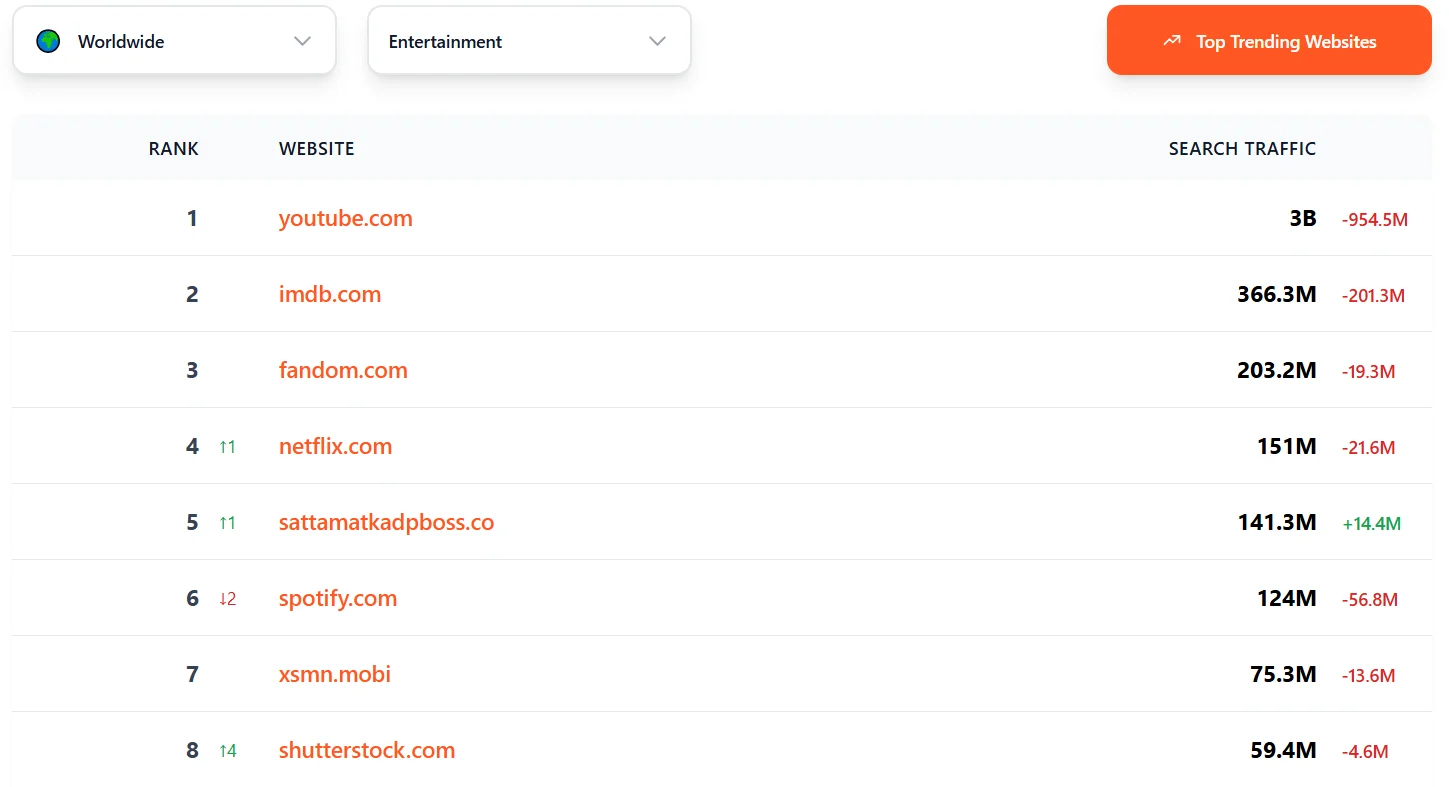
Although Ukrainian projects cannot yet compete with major global English-language platforms, there is still significant demand for entertainment content. In 2025, the domestic entertainment market (streaming, online gaming) was estimated at $25.8 million, and by 2029, it is expected to grow to $38.2 million. Among the largest Ukrainian projects, movie and TV show websites stand out in particular — according to SimilarWeb, uakino.best had 62.3 million visits in August 2025.
How Much Can You Earn from an Entertainment Website
Entertainment projects have a relatively low RPM (revenue per 1,000 page views) compared to financial or educational websites. However, they can still generate solid earnings thanks to high traffic volumes, often driven through social media, content platforms, and forums.
The simplest way to make money from an entertainment website is by connecting Google AdSense. The RPM of an English-language website ranges from $0.5 to $2.5, meaning that with 10,000 monthly visitors, you can expect to earn $5–25, and with 500 000 visitors — $250–1000. In Ukraine, the average RPM for entertainment websites is around $0.2–$0.8, so 10,000 visitors would bring in $2–8, and 500 000 visitors — $100–400.
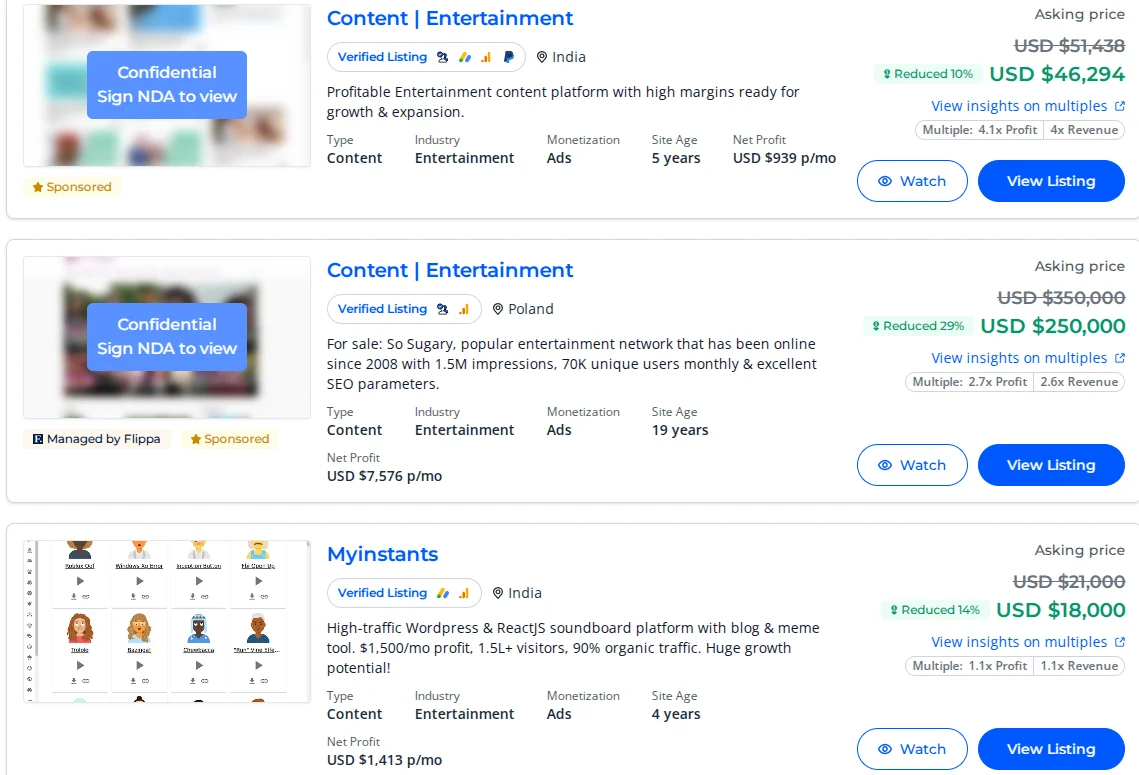
Examples of entertainment websites listed on Flippa show monthly advertising earnings ranging from $900 to $7500.
You can earn much more through affiliate offers, even with relatively low traffic. For example, the same 10 000 monthly visitors on an English-language website can generate $50–150, while a Ukrainian-language site can earn $15–50. With 500 000 visitors, potential monthly earnings reach $1500–4000 for English-language platforms and $500–1500 for Ukrainian-language ones.
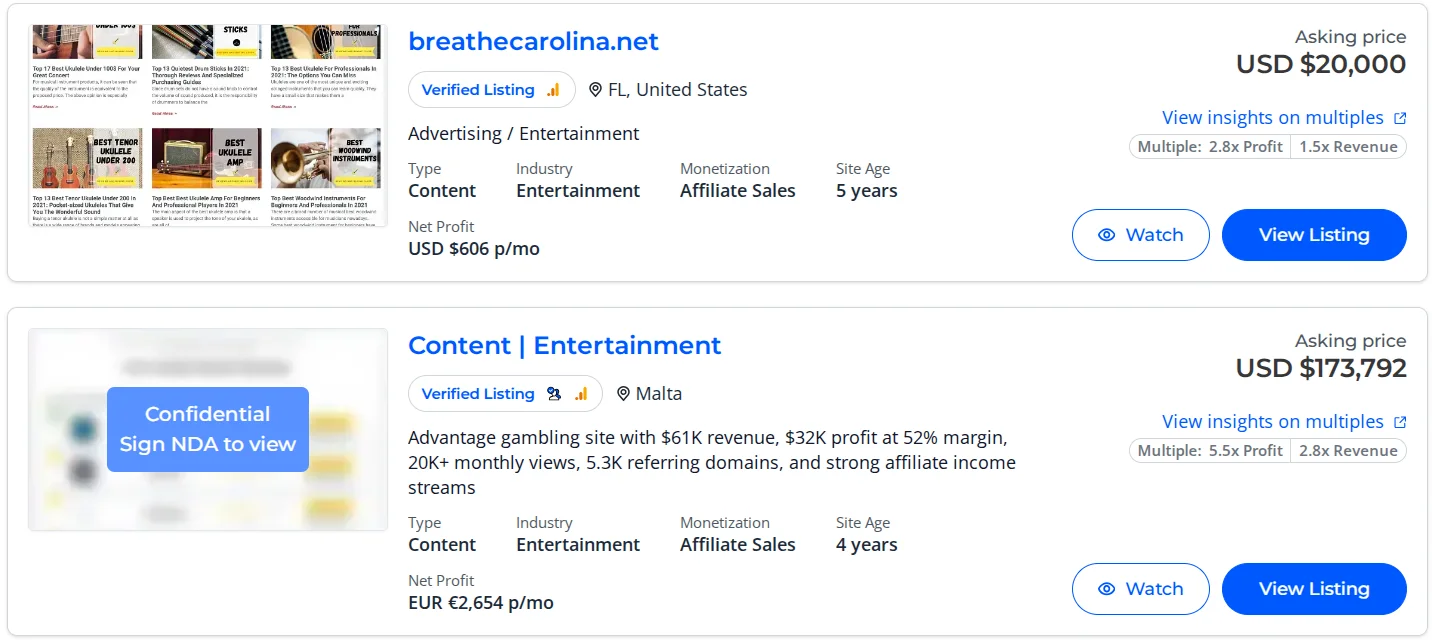
Examples of entertainment websites earning $600–2500 monthly through CPA networks.
Thus, even with just two monetization methods, an entertainment website can generate $55–175 per month (10 000 visitors, English-speaking audience) or $17–58 per month for a Ukrainian audience. Additionally, you can increase revenue through premium subscription content, direct advertising, and donations — monetization methods we’ll discuss later.
Read also: TOP-7 non-trivial ways to earn money on the Internet
What Types of Entertainment Websites Exist
There are dozens of types of entertainment websites — from simple celebrity news portals to large gaming platforms and edutainment projects. Of course, creating a competitor to Netflix, Roblox, or National Geographic on your own is extremely difficult.
That’s why we’ll focus on the main types of entertainment websites that can be developed without programming skills or multi-million-dollar investments:
- Local event websites. Despite all challenges, various events continue to take place in Ukraine, though finding out about them is often difficult. You can help people by creating a platform with event announcements and photo reports. Start with a simple blog on WordPress or Wix, and later scale it into a larger portal with podcasts, quizzes, and animated stories.
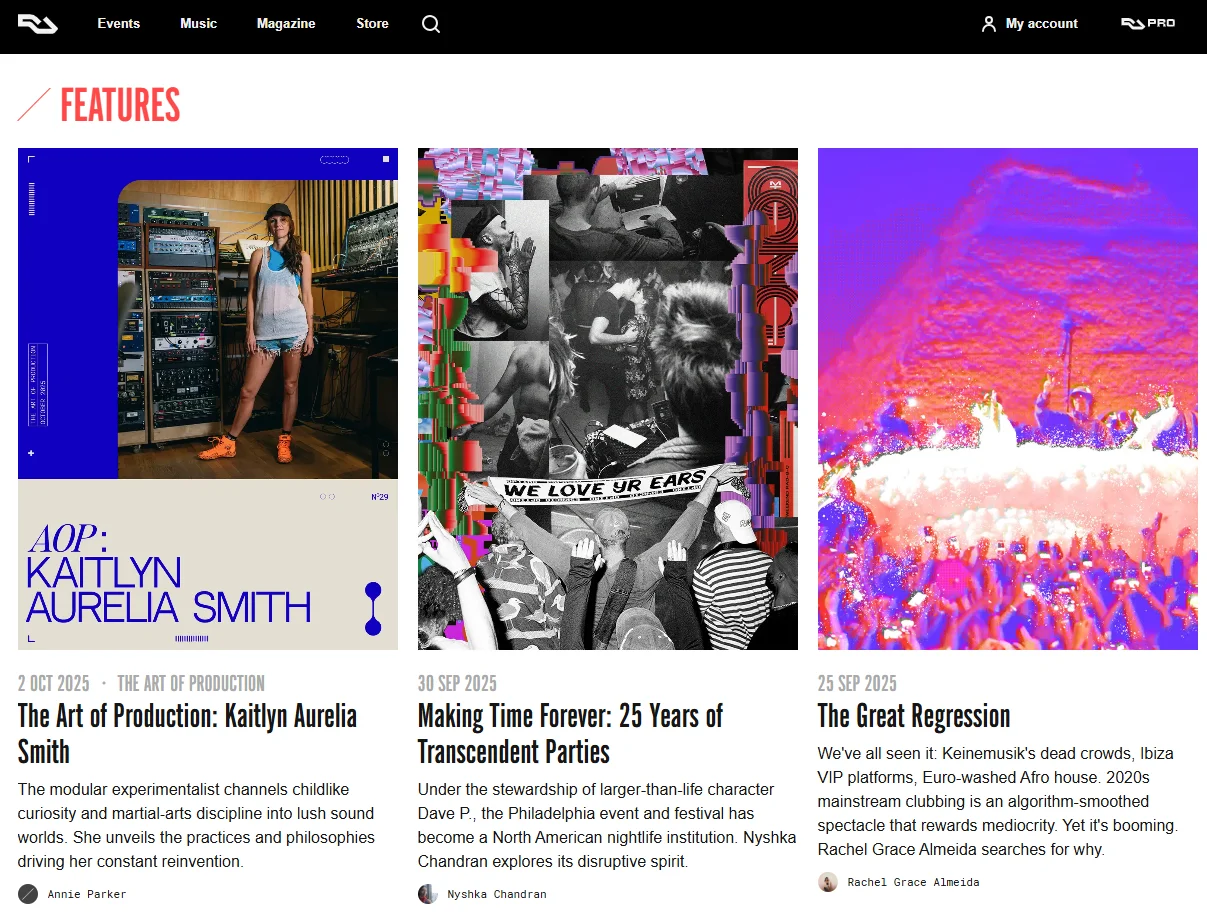
Resident Advisor is an international online platform that not only covers events but also publishes full reviews of clubs and festivals, as well as features on different music genres, DJs, and producers. Its monthly audience exceeds 7.9 million people worldwide.
- Humor websites. You can create a simple CMS-based website, choose a basic theme, and regularly post humorous articles, quizzes, memes, animated illustrations, and mini-games.
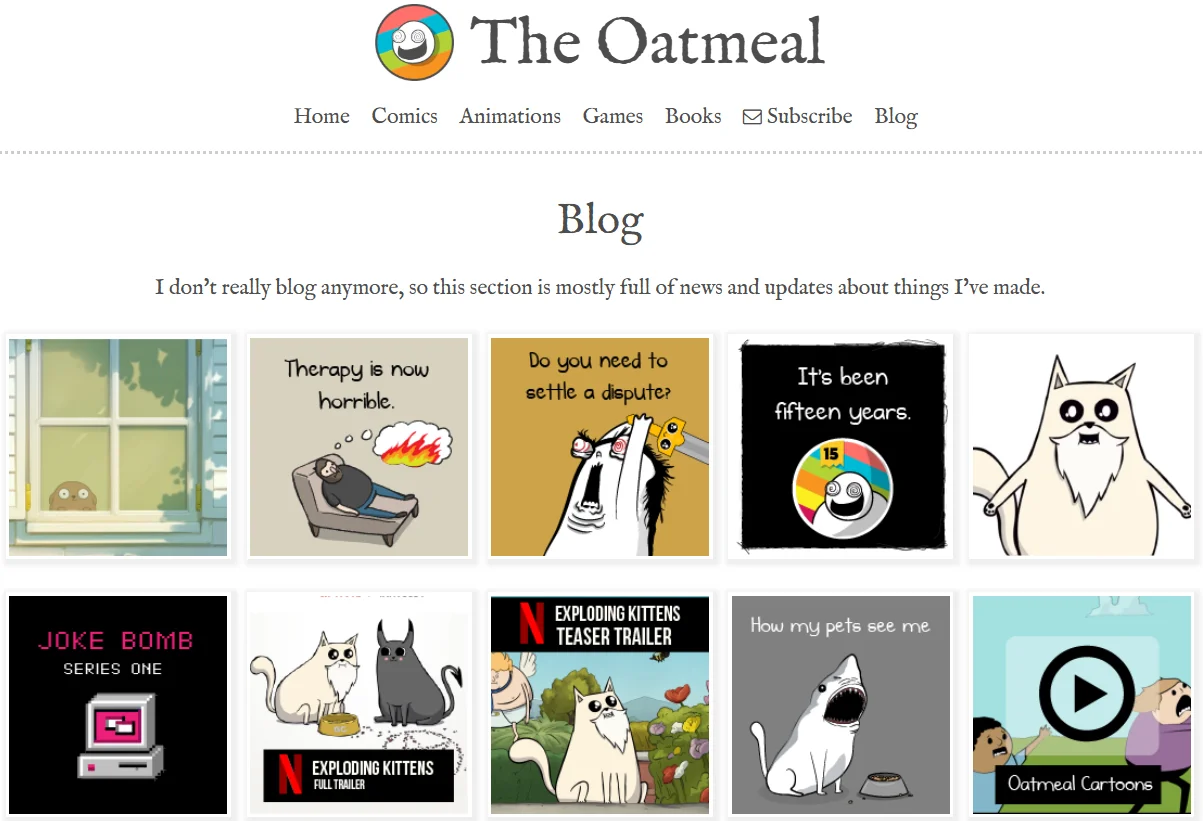
A great example is The Oatmeal, which attracts over 500 000 monthly visitors globally and, according to various sources, generates an annual income of $15–25 million.
- Quiz and test portals. These websites feature interactive quizzes such as “Which character are you?” along with explanations of the results. Such projects have a low entry threshold, users love to share results on social media, and you can place ad blocks and affiliate links at any stage of the quiz.
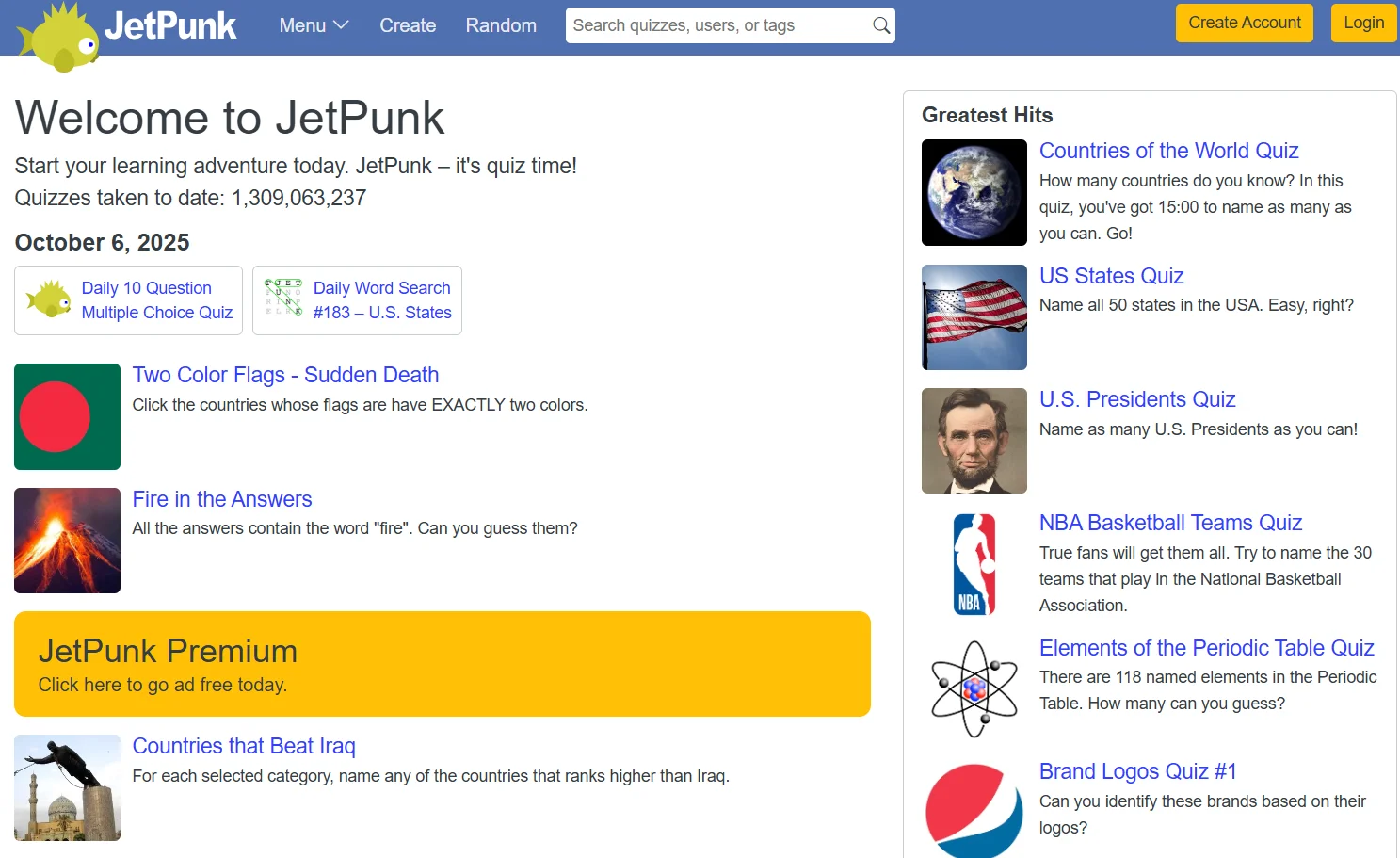
One of the most popular projects in this category is JetPunk, which receives around 7.8 million visits per month.
- Audio-content websites. The topic can be anything — music, films, or everyday stories — the main idea is to publish audio episodes with transcripts. In the beginning, you can record using a smartphone with free software like Audacity, or even create AI-generated podcasts with tools such as ElevenLabs.
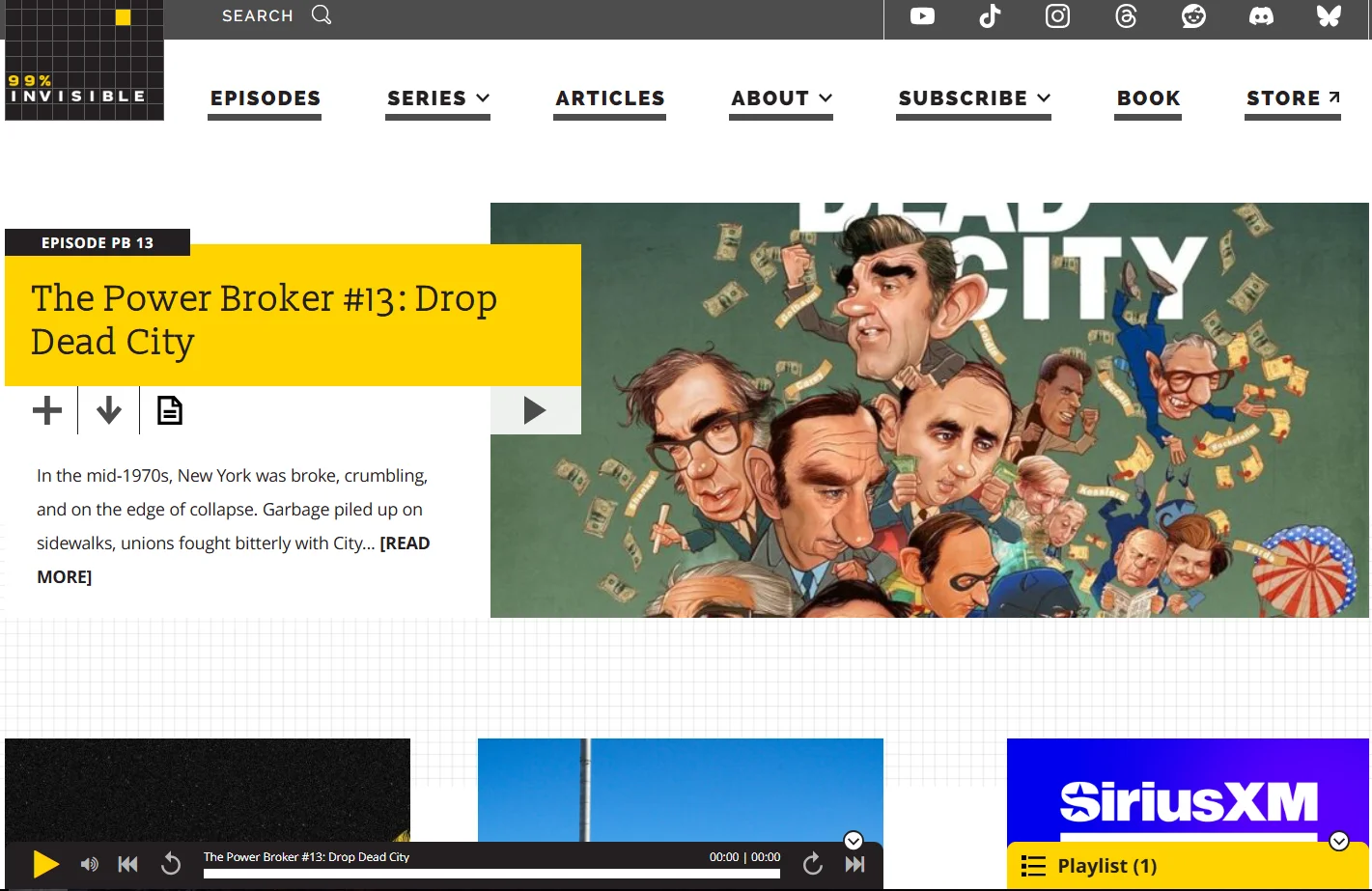
There’s strong demand for this kind of content — for instance, the entertainment website 99% Invisible attracts over 236 000 monthly visitors.
- Gaming platforms. Even without programming knowledge, you can create an entertainment website with online games. All you need is a reliable affordable hosting, a domain, a CMS installation, a few basic pages, and a game catalog. To build simple browser games, you can use GDevelop (the free plan is enough), Construct 3 (costs $15.99 per month, with a free version that includes some limitations), while Bitsy and Twine are great for small projects and interactive stories. You can also use ready-made open-source projects under CC0 or MIT licenses.
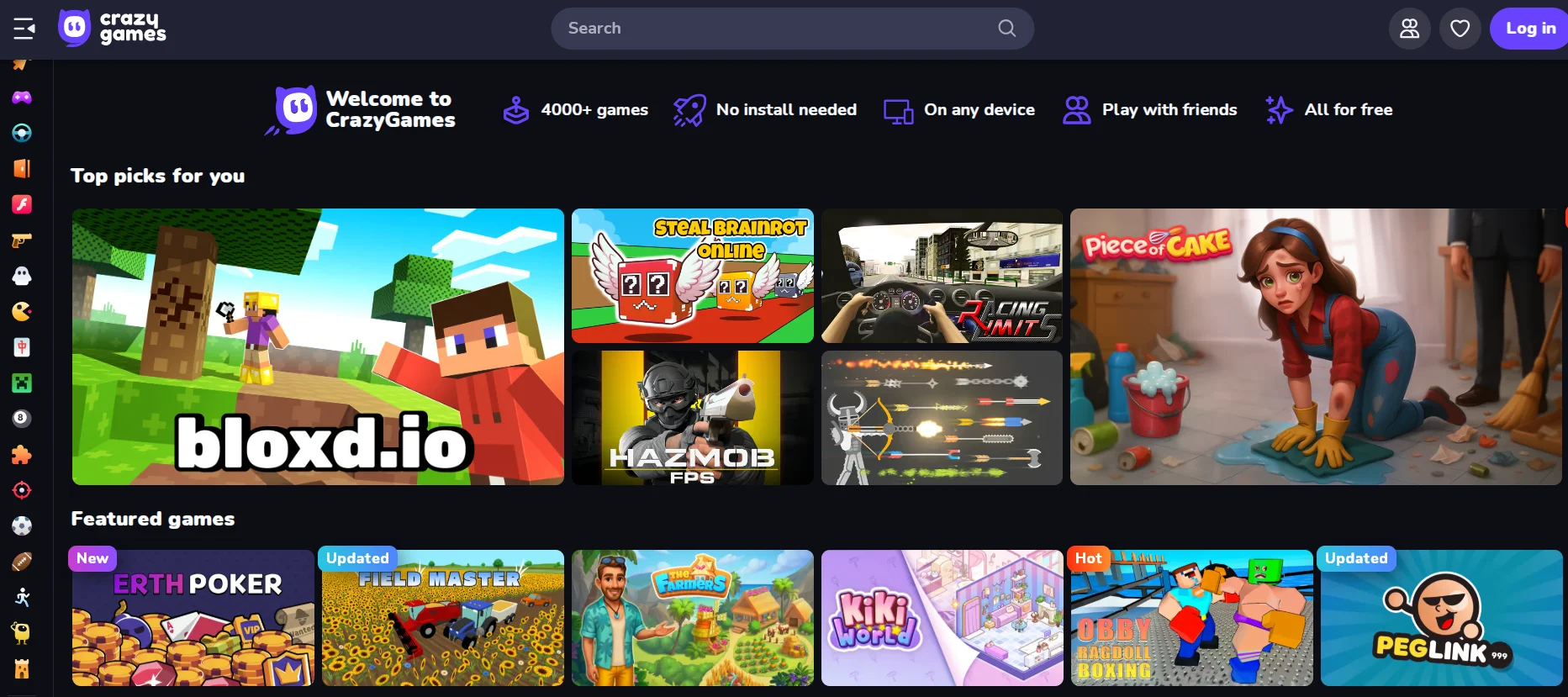
CrazyGames is one of the most well-known Ukrainian entertainment sites featuring browser games, attracting over 230 000 monthly visitors.
The examples above represent only a few of the most popular types of entertainment websites. You can create a web resource on almost any topic — the key is to make it emotional, light, and interactive. In other words, the main focus should be on how you present content, how you interact with your visitors, and your desire to bring them joy and a good mood.
How to Create an Entertainment Website from Scratch: From Idea to Monetization
When such an idea comes to mind, we often think of massive projects like Netflix, TikTok, Spotify, or Fandom. However, you don’t need to build a huge online platform to start earning — you can begin with a simple blog and gradually add engaging modern elements such as quizzes, animated stories, or AI-powered content generators. In this section, we’ll explain how to develop an entertainment website from scratch with minimal investment, so you can apply these key principles to your own project.
Define the Concept of Your Entertainment Website
The first step is to develop a clear concept. It’s understandable that you want to launch your website as quickly as possible, but without a well-defined concept, it will soon turn into a chaotic collection of random content without any identity.
Let’s go through the process of defining your website’s concept with an example:
- Choose a niche. For instance: cinema, music, gaming, travel, psychology. Let’s take self-discovery as our example — but not in the form of lectures or therapy, rather as light, engaging content that helps users better understand themselves.
- Identify your target audience. Ask yourself: what concerns these people? How old are they? What exactly do they need? In our example, the target audience is Ukrainians aged 20–45 who are interested in psychology and want to find answers to questions like “Why do I procrastinate?”, “Why do I react this way?”, or “How can I understand what I truly enjoy?”. A quick tip: analyze competitors’ audiences using tools like SimilarWeb or Semrush, and review information on their About pages, media kits.
- Choose your content formats. It’s important to understand what kind of content your target audience expects from entertainment websites. While they might be open to reading scientific long reads elsewhere, on your platform they’ll prefer lighter materials — engaging short stories, quizzes, or inspirational quotes. Therefore, offer blog articles, Instagram-style stories, and a section with interactive quizzes.
- Define the details. Start by shaping your tone of voice: calm, supportive, and friendly — like a “helpful expert” without arrogance. Your language should be simple, warm, and free of excessive jargon. Next, move on to the visual style: use light colors, illustrations, minimalistic design, and smooth animations.
- Add unique features. Even in the Ukrainian market, there are already many self-discovery blogs — and even more in the English-speaking world. To stand out, include interactive features such as a series of psychological quizzes, themed memes (or even a meme generator), daily interactions like “Quote of the Day” or “Test of the Week”. You can even add relaxing browser games or short AI-generated meditations.
Defining a clear concept makes your entire process much easier. For example, you’ll be able to quickly choose and customize a theme that appeals to your target audience instead of turning them away. It will also help you create cohesive content — for instance, linking quizzes to related articles — which will increase the average time users spend on your website.
Read also: Best AI Services for Content Creation: from Texts to Images
Registering Hosting and a Domain for an Entertainment Platform
Let’s start with the domain. On the Cityhost website, you can register domains in both Ukrainian and international zones, including .ua, .com, .com.ua, .org, and .net. We recommend choosing a short domain name — ideally one or two words — that is easy to remember and pronounce.
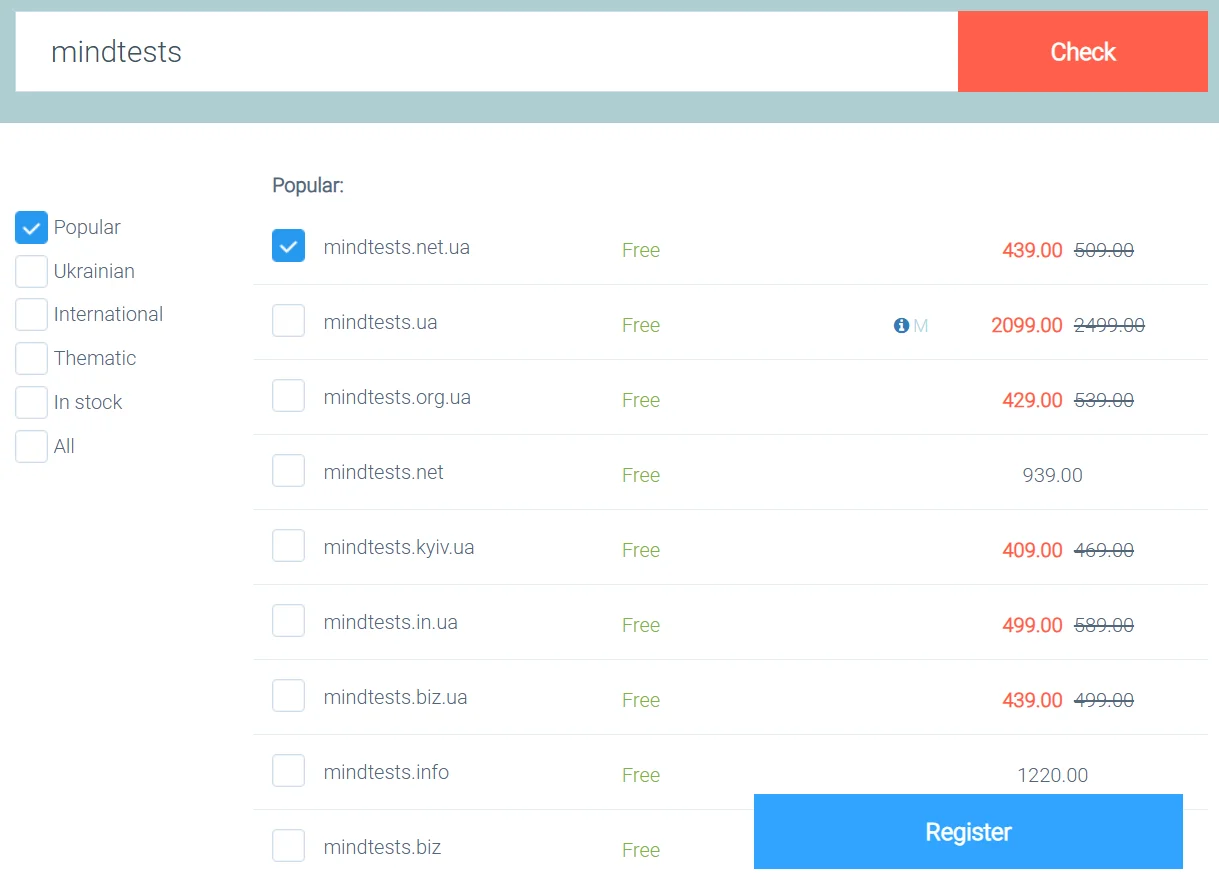
You can check domain availability directly on the platform: enter your desired name, click “Check”, and the system will display available options and their status. Once you’ve chosen the right domain, select it by ticking the box and click “Register”.
Before registering hosting, it’s important to understand the differences between available options. At the initial stage, a shared hosting plan is ideal — it’s the most affordable, easy to set up, and simple to manage. As your project grows and you add more interactive features, you can upgrade to a virtual private server (VPS) or a dedicated server, which allows you to install any software you need. You can learn more about the different types of hosting here.
Building the Foundation of an Entertainment Website
After registering your hosting (server) and domain, it’s time to start developing your entertainment website. Of course, you can hire a professional developer to create a custom web platform, but if you’re working with a limited budget, it’s better to use a CMS (WordPress, Joomla, HubSpot, or Drupal) or website builders (Wix, Weblium). We’ve chosen WordPress — a free and flexible CMS that supports all types of content and offers thousands of themes and plugins. Moreover, the Cityhost control panel includes a convenient auto-installer for CMS platforms, including WordPress.
When you install a CMS, you’ll get a default theme, but it’s best to replace it right away. We recommend popular themes such as Astra, GeneratePress, Blocksy, or Kadence. To install a new theme download the ZIP archive from the official website of the chosen theme. Go to your WordPress dashboard → Appearance → Themes → Add Theme → Upload Theme. Alternatively, you can search for available templates directly in the WordPress library, click Install, and then Activate the one you like.
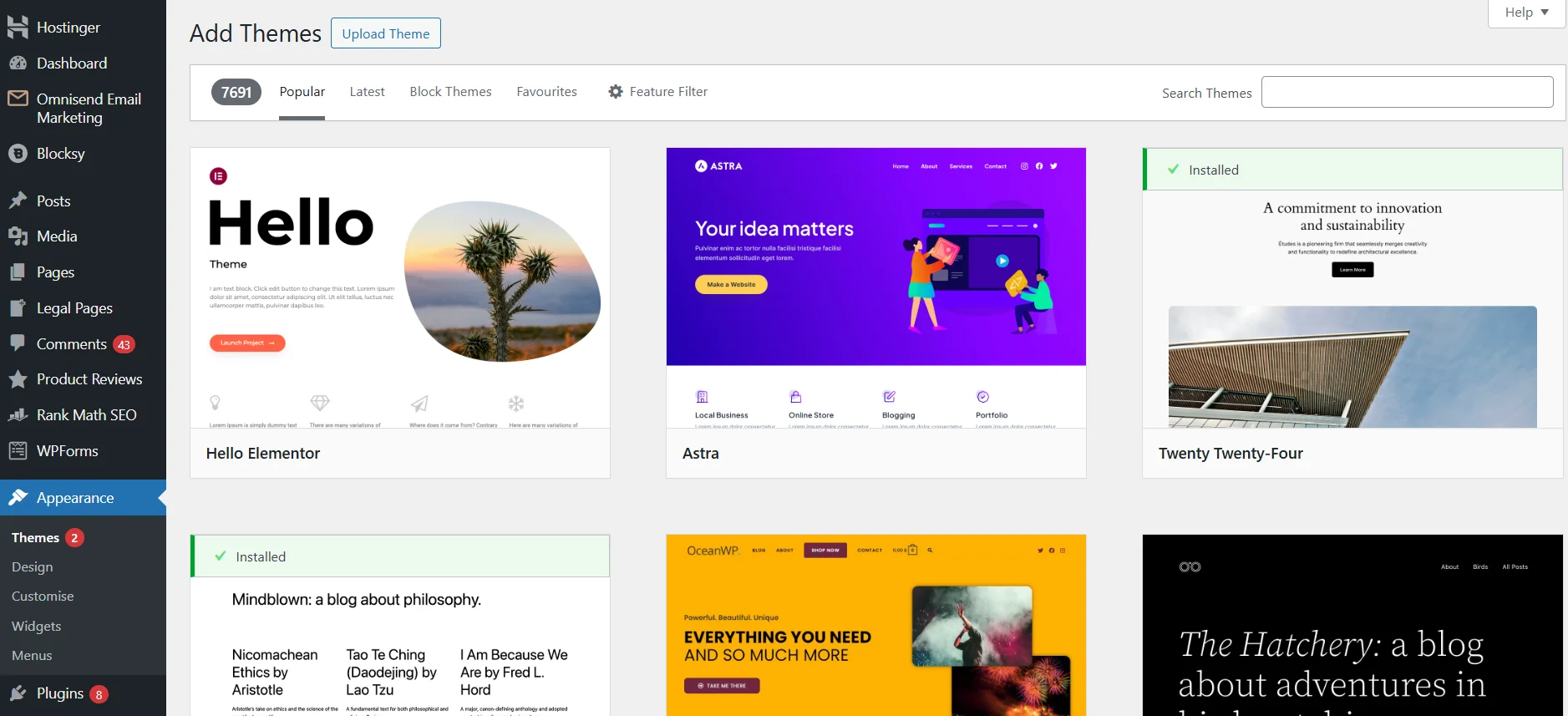
Next, install plugins that will help improve SEO, enhance security, and add interactivity to your website. If you’re not sure where to start, here are some recommended plugins:
- All In One WP Security & Firewall — provides protection by adding CAPTCHA, file access control, and visitor logs.
- Wordfence — checks the integrity and safety of themes and plugins, blocks malicious traffic, and protects from hackers and botnets.
- LiteSpeed Cache — enables caching of HTML, CSS, and JS files to improve website speed.
- Rank Math SEO or Yoast SEO — helps configure sitemaps, meta tags, breadcrumbs, structured data, 404 monitoring, redirects, and on-page SEO optimization.
- WPCode — allows you to add PHP, JavaScript, CSS, or HTML to your site without manually editing the source code.
- WPForms or Contact Form 7 — create various types of forms for feedback and email collection.
- Site Kit by Google or MonsterInsights — display visitor statistics and behavior analytics directly in the WordPress dashboard.
- Web Stories by Google — create vertical stories to make your content stand out from competitors with traditional articles.
- JetFormBuilder, Quiz and Survey Master, Quiz Cat, or HD Quiz — tools for building quizzes with conditional logic (adapting questions based on answers), text fields, timers, multiple-choice options, and result analysis.
- GamiPress — adds digital rewards for user engagement, allowing you to set up points, achievements, and ranks that users can share on social media.
- PuzzleMe — lets you create puzzles such as crosswords, Sudoku, and word searches, then embed them using shortcodes.
- Seriously Simple Podcasting, PowerPress, or AudioIgniter — plugins for creating, publishing, and monetizing podcasts.
- AI Engine — integrates artificial intelligence tools, such as AI chatbots or image generators.
- Tidio — enables live chat and AI-powered interactions, letting users ask questions, play role-based games, and more.
These are only a few of the many available plugins for entertainment websites. However, we do not recommend installing all of them at once. Instead, start with 5–6 core plugins (for security, SEO, caching, and feedback) and 2–3 interactive ones (for quizzes, stories, or AI features). Always monitor how each plugin affects your website’s performance, usability, and visitor experience.
Read also: Plugins for WordPress You Should Install Right Away — A Checklist for Launching Your Website
Filling Your Entertainment Website with Content
Now it’s time to show the true value of your entertainment website — by adding the first pieces of content that reflect your project’s concept, generate initial traffic, and send behavioral signals to search engines. Start by creating basic pages such as About Us, Privacy Policy, and Terms and Conditions.
Then move on to filling your website with engaging entertainment content. In our case, the site will include the following sections:
- Blog — articles with tips, facts, and self-reflection topics, for example: “How to Restore Energy Without Taking a Vacation?” or “Top 10 Relationship Myths”.
- Stories — short visual series such as “5 Tips for a Better Mood” or “5 Facts About Your Emotions”.
- Quizzes — psychological and entertainment tests or interactive activities like “What’s Your Archetype?” or “What Does Your Reaction to Stress Reveal?”.
- Quotes — short statements and affirmations that visitors can easily share on social media, such as “You have the right to rest”.
For better SEO and user engagement, interconnect your content across sections. For instance, include several quotes within a blog article and link to the full collection in the “Quotes” section. Or, after displaying quiz results, add links to relevant blog posts that help users better understand certain topics.
Read also: What Is Evergreen Content and How to Find Topics for It
Connecting Monetization to Your Entertainment Website
It’s time to turn your entertainment website from a hobby into a stable source of income. However, don’t rush into adding ads right away — while you can apply for Google AdSense within the first three months of launching your site, the revenue will likely be just a few dollars, and advertising banners might annoy early visitors. Instead, focus on creating high-quality content and building steady traffic first — and only then move on to monetization.
Although earlier in the article we mentioned only contextual advertising and affiliate networks to illustrate potential earnings, there are actually many different ways to monetize an entertainment website:
- Contextual Advertising. Once your website is properly set up, with core pages and at least 20–30 pieces of content, and your monthly traffic reaches 100–1000 visitors, you can apply for Google AdSense. When your traffic grows to 10 000 monthly visitors, try Ezoic, which offers higher earnings per 1000 views. If your English-language project attracts 50 000–100 000 monthly visitors, you can apply for Mediavine or AdThrive, which provide the highest RPM rates.
- Affiliate Programs. Admitad, MyLead, and PartnerStack are among the most reliable and well-known CPA networks that support withdrawals via Payoneer and/or Ukrainian bank cards. They offer numerous affiliate programs, including partnerships with Calm, Headspace, Wysa, and BetterHelp. This monetization method requires at least 2000–3000 monthly visitors (some offers may accept sites with as few as 100, but it’s better to wait until your traffic grows).
- Direct Advertising. If your website reaches a stable audience of 10 000–20 000 monthly visitors and has a good reputation, advertisers may start contacting you directly for sponsored content, native placements, or brand collaborations. Earnings in this category can range from $50–100 to several thousand dollars per campaign.
- Selling Digital Products. You can start earning even with as few as 1000 monthly visitors — the key is to have returning users. For example, in our case, we could sell PDF journals (“30-Day Emotion Tracker”), collections of self-reflection quizzes, digital affirmation card sets, exclusive materials, and additional personal stories about self-discovery.
- Donations. Platforms like Ko-Fi, BuyMeACoffee, and Patreon make it easy to collect donations. To make this model more effective, offer extra value — such as downloadable PDFs or extended versions of your quizzes.
You might wonder: “It’s clear how contextual ads and affiliate offers work, but who would buy digital products or donate?” The answer is simple — anyone who genuinely enjoys your content.
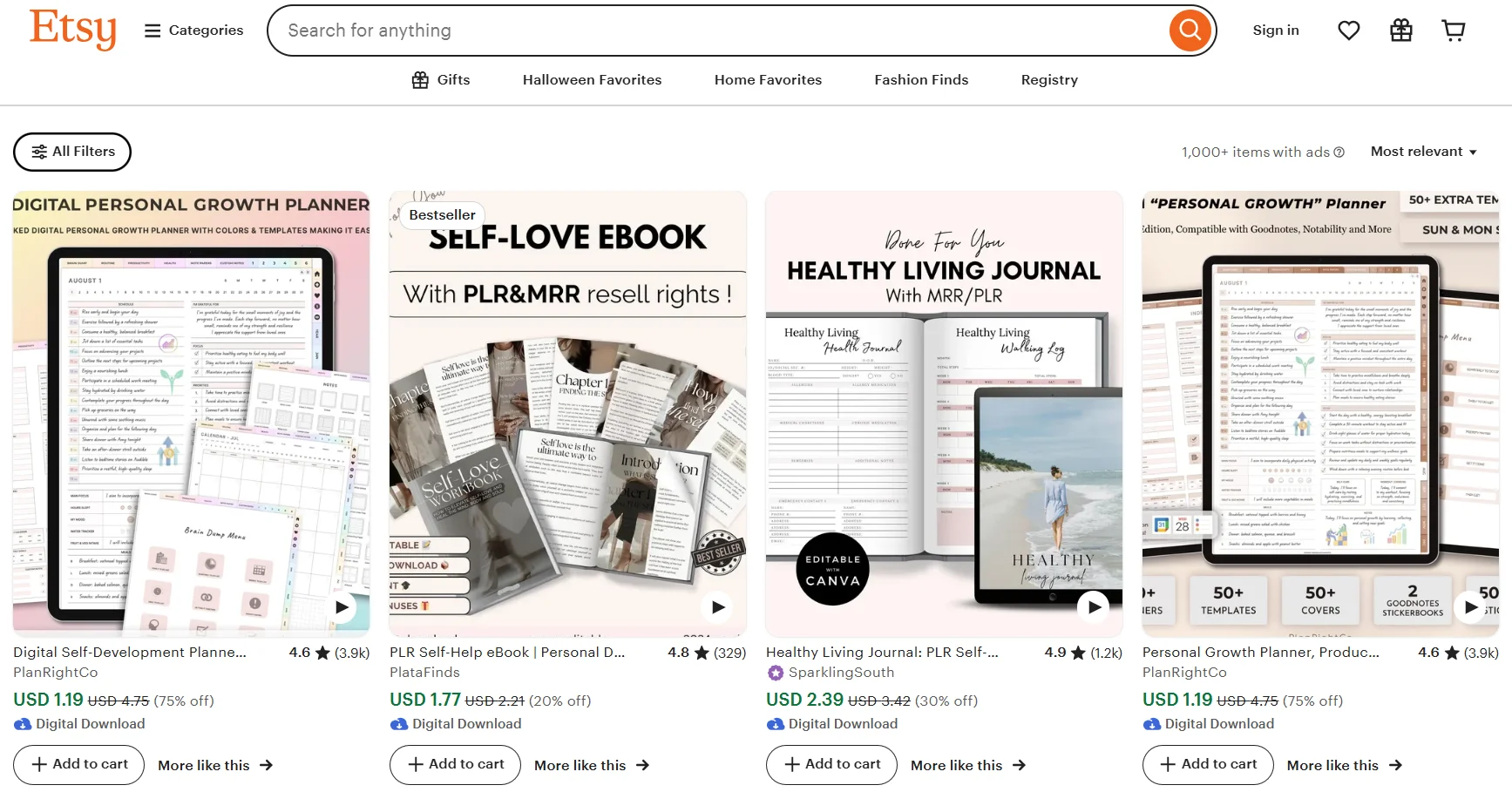
Just browse through the digital products section on Etsy or creators’ pages on Patreon, and you’ll see plenty of successful sellers and subscribers. If your products are genuinely valuable and relevant to your audience, people will gladly support your work.
How to Create an Entertainment Website on Your Own: Useful Tips
Creating an entertainment website is both a relatively simple and an incredibly complex process. You can quickly rent affordable hosting and a domain, install a content management system, choose a free theme, and set up the essential and additional plugins. However, promoting your website can take significant time — crafting engaging content and adding interactive features your audience will love, adapting to algorithm updates such as Google March 2024 Update, and competing with AI-generated content in search results.
Based on our experience and our clients’ results, here are several valuable tips for creating and promoting an entertainment website:
- Preparation is everything. Do thorough groundwork before you start — analyze the market, audience, and competitors, define your site’s structure, and determine your content formats and presentation style. Tools like Google Trends, or free versions of Semrush and SimilarWeb, will help you conduct research efficiently.
- Keep it simple. There’s no need to rent a dedicated server right away — shared hosting is perfectly fine for beginners. You don’t need a team of programmers or technical expertise to create an entertainment site. With CMS platforms, ready-made themes, and plugins, you can build everything yourself.
- Focus on mobile. According to SimilarWeb data from September 2025, 69.68% of all internet traffic comes from mobile devices. This means your website must be mobile-friendly — use responsive themes, avoid heavy elements, and compress images to minimize load times.
- Embrace AI. You can complain about artificial intelligence all you want, but it’s here to stay — so it’s better to learn how to use it effectively. While you should still strive to create original or high-quality human-written content, AI tools like ChatGPT or Grok can assist with planning, analytics, and even adding interactive AI-based elements to your site.
- Optimize for SEO. Even though AI and paid ads make ranking in search engines more competitive, organic search traffic remains one of the most valuable. Develop a detailed sitemap, optimize your pages, articles, stories, and quizzes using Rank Math SEO or Yoast SEO, implement internal linking, and work on growing your backlink profile.
- Monetize gradually. We understand the temptation to start earning as soon as possible, but don’t rush into using all monetization methods at once. Start with one or two Google AdSense banners per page, then gradually add affiliate offers — but promote them naturally, without being intrusive. Once you build a loyal audience, move on to direct ads, or upgrade to Ezoic or Mediavine, and eventually start selling digital products.
- Analyze continuously. Install Google Analytics 4 and Search Console, along with plugins like MonsterInsights (or similar alternatives), and regularly review which pages attract the most attention, where visitors come from, and what actions they take on your site. This will help you identify the most effective content and grow your traffic strategically.
An entertainment website is an online platform created to give people positive experiences. And in 2025, there are countless tools available — most of them completely free. The key is to start now, even with a small blog. If you stay consistent and creative, you can gradually expand it into a large, modern portal full of interactive features — turning your hobby into a profitable online business.










